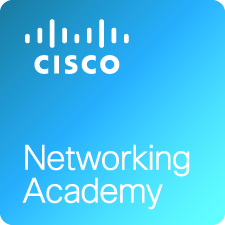CCNA v7
Το πρόγραμμα «CCNA v7.02» είναι ένα εκπαιδευτικό πρόγραμμα της Cisco που απευθύνεται σε όσους ενδιαφέρονται να μάθουν να σχεδιάζουν, να εγκαθιστούν και να συντηρούν δίκτυα μικρών και μεσαίων επιχειρήσεων καθώς και δίκτυα σε περιβάλλοντα εταιρικά και παροχής υπηρεσιών.

Η Infolab ανήκει στο παγκόσμιο δίκτυο των Επίσημων Ακαδημιών της Cisco (Cisco Networking Academy) και διοργανώνει υψηλών προδιαγραφών τεχνικές εκπαιδεύσεις για επαγγελματίες IT σε θέματα Networking και Security.
Τα μαθήματα υλοποιούνται από πιστοποιημένους εισηγητές (Cisco Certified Instructors) και προετοιμάζουν τους συμμετέχοντες για τις διεθνώς αναγνωρισμένες επαγγελματικές πιστοποιήσεις της Cisco.
Επιλέξτε την Infolab για την εκπαίδευσή σας, γίνετε μέλη της Cisco Academy και κερδίστε έκπτωση στην εξέταση πιστοποίησης CCNA 200-301, δωρεάν practice test για την εξέταση CCNA 200-301 και δωρεάν συμμετοχή στο σεμινάριο AZ-900 Microsoft Azure Fundamentals!
Διάρκεια προγράμματος :

Classroom |
 Live Online Live OnlineΜε καθηγητή : 200 ώρες |

Έκπτωση 20% στο τμήμα Φεβρουαρίου για εγγραφές έως 30/01
+
Δωρεάν συμμετοχή στο AZ-900 Microsoft Azure Fundamentals
+
Δωρεάν Practice test για την εξέταση CCNA 200-301
The Cisco CCNA Routing and Switching curriculum is designed for Cisco Networking Academy students who are seeking entry-level jobs in the ICT industry or hope to fulfill prerequisites to pursue more specialized ICT skills.
CCNA Routing and Switching provides an integrated and comprehensive coverage of networking topics, from fundamentals to advanced applications and services, while providing opportunities for hands-on practical experience and career skills development.
The curriculum is appropriate for students at many education levels and types of institutions.
Introduction to Networks (ITN)
Introduction to Networks (ITN) covers the architecture, structure, functions and components of the Internet and other computer networks. Students achieve a basic understanding of how networks operate and how to build simple local area networks (LAN), perform basic configurations for routers and switches, and implement Internet Protocol (IP).
By the end of the course, students will be able to:
· Configure switches and end devices to provide access to local and remote network resources.
· Explain how physical and data link layer protocols support the operation of Ethernet in a switched network.
· Configure routers to enable end-to-end connectivity between remote devices.
· Create IPv4 and IPv6 addressing schemes and verify network connectivity between devices.
· Explain how the upper layers of the OSI model support network applications.
· Configure a small network with security best practices.
· Troubleshoot connectivity in a small network.
Switching, Routing, and Wireless Essentials (SRWE)
Switching, Routing, and Wireless Essentials (SRWE) covers the architecture, components, and operations of routers and switches in small networks and introduces wireless local area networks (WLAN) and security concepts. Students learn how to configure and troubleshoot routers and switches for advanced functionality using security best practices and resolve common issues with protocols in both IPv4 and IPv6 networks.
By the end of the course, students will be able to:
· Configure VLANs and Inter-VLAN routing applying security best practices.
· Troubleshoot inter-VLAN routing on Layer 3 devices.
· Configure redundancy on a switched network using STP and EtherChannel.
· Troubleshoot EtherChannel on switched networks.
· Explain how to support available and reliable networks using dynamic addressing and first-hop redundancy protocols.
· Configure dynamic address allocation in IPv6 networks.
· Configure WLANs using a WLC and L2 security best practices.
· Configure switch security to mitigate LAN attacks.
· Configure IPv4 and IPv6 static routing on routers.
Enterprise Networking, Security, and Automation (ENSA)
Enterprise Networking, Security, and Automation (ENSA) describes the architecture, components, operations, and security to scale for large, complex networks, including wide area network (WAN) technologies. The course emphasizes network security concepts and introduces network virtualization and automation. Students learn how to configure, troubleshoot, and secure enterprise network devices and understand how application programming interfaces (API) and configuration management tools enable network automation.
By the end of this course, students will be able:
· Configure single-area OSPFv2 in both point-to-point and multiaccess networks.
· Explain how to mitigate threats and enhance network security using access control lists and security best practices.
· Implement standard IPv4 ACLs to filter traffic and secure administrative access.
· Configure NAT services on the edge router to provide IPv4 address scalability.
· Explain techniques to provide address scalability and secure remote access for WANs.
· Explain how to optimize, monitor, and troubleshoot scalable network architectures.
· Explain how networking devices implement QoS.
· Implement protocols to manage the network.
· Explain how technologies such as virtualization, software defined networking, and automation affect evolving networks.
Students will be prepared to take the:
· Cisco CCNA (200-301 CCNA)
The CCNA Certification helps learners develop workforce readiness skills and builds a foundation for success in networking-related careers.
Achieving CCNA certification is the first step in preparing for a career in IT technologies.
No prerequisites.
Before taking the CCNAv7 course, learners should be familiar with:
• Basic computer literacy Basic Internet usage skills
• Basic PC operating system navigation skills
| Τόπος | Ημερομηνίες | Ωράριο | Μέθοδος |
|---|---|---|---|
| Live Online* | 25-Φεβ έως 23-Σεπτ | Τρ, Πε 18:00-21:15 | Instructor Led |
* Σύγχρονη εξ αποστάσεως εκπαίδευση με εισηγητή – Virtual Class
Last update : 01/09/2023

